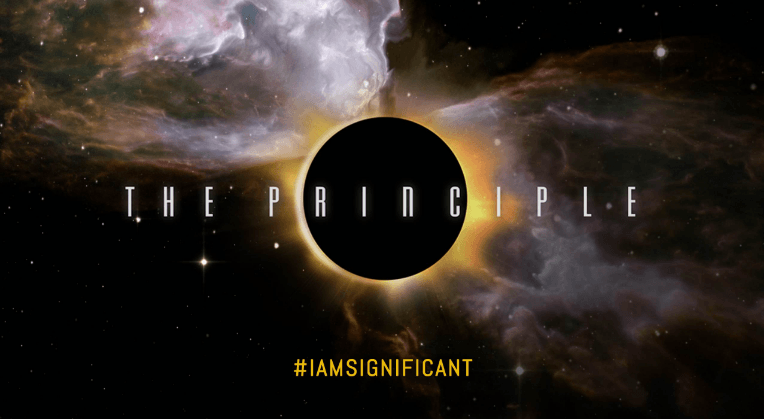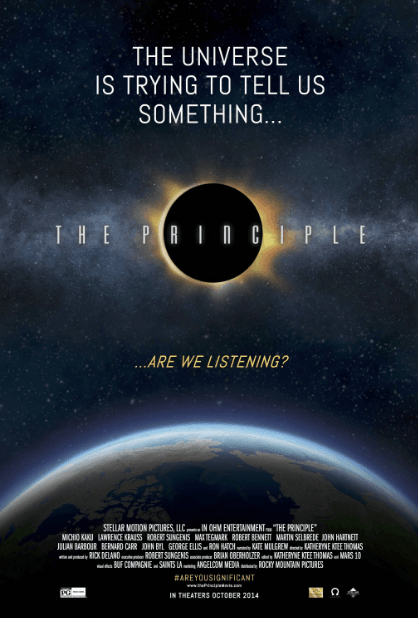
It’s been close to 2 years since the highly controversial documentary ‘The Principle’ first emerged and challenged the world of astrophysics and cosmology and the film to this day continues to elicit strong opinions. After all, ‘The Principle’ questions the current thinking of the Earth’s place in the cosmos and sets out to give evidence that perhaps Copernicus was incorrect and all our conclusions based on his theory are wrong.
While the film was in limited release last year amidst the contentious backlash from those who appeared in it (including Michio Kaku and the narrator of the film Kate Mulgrew), ‘The Principle’ has found itself a following and is now available to purchase on iTunes.
ScienceFiction.com was able to catch up with producer Rick DeLano talk about what has been happening since the release of the film:
ScienceFiciton.com (SF): So it’s been a year and a half since we last talked to you about the film, could you update us on what has been happening since?
 Rick DeLano (RD): It’s been an interesting year and a half. We basically experienced something very unique and interesting with this film. A very tiny and insignificant science documentary suddenly blew up and was carpet bombed. Very rarely do you see a story like this run like that one did. When it took off, we answered all of the claims from that media campaign. Phase 2 was actually very effective. Phase 2 was a cone of silence. You could not find anybody who would say a syllable about ‘The Principle’ in all those media outlets that were all over it in the beginning. The cone of silence was really quite effective because it was accompanied by… basically, the word went out “don’t touch this” and “don’t have anything to do with it” and that was a much more effective strategy. It almost worked because at that point we pretty much expended our reserves and we were essentially pushed to the domain of the red-headed stepchild, so to speak.
Rick DeLano (RD): It’s been an interesting year and a half. We basically experienced something very unique and interesting with this film. A very tiny and insignificant science documentary suddenly blew up and was carpet bombed. Very rarely do you see a story like this run like that one did. When it took off, we answered all of the claims from that media campaign. Phase 2 was actually very effective. Phase 2 was a cone of silence. You could not find anybody who would say a syllable about ‘The Principle’ in all those media outlets that were all over it in the beginning. The cone of silence was really quite effective because it was accompanied by… basically, the word went out “don’t touch this” and “don’t have anything to do with it” and that was a much more effective strategy. It almost worked because at that point we pretty much expended our reserves and we were essentially pushed to the domain of the red-headed stepchild, so to speak.
So we did something very interesting – and this is going to be a very important part of the story – we decided that we would absolutely control our own destiny. We would not give this film to a distributor. We would not give this film out to mainstream channels. We would not even seek any distribution of the film except on our very own platform under our very own control and we said we would either find an audience for this film or we would fail. And we found our audience for the film.
SF: You did do a DVD release, right?
 RD: We did the DVD release, the very first film to go on our platform. Nobody could find it. Nobody knew where it was but somehow they found us and they continue to find us. And we basically had to establish that the film on its merits was good enough. That it would continue to sell and continue to grow and what I’m going to add is they [the naysayers] wouldn’t win.
RD: We did the DVD release, the very first film to go on our platform. Nobody could find it. Nobody knew where it was but somehow they found us and they continue to find us. And we basically had to establish that the film on its merits was good enough. That it would continue to sell and continue to grow and what I’m going to add is they [the naysayers] wouldn’t win.
The fact of the matter is that the film is damn good. Everyone who saw it knows that. Everyone who saw it knows that it’s nothing like what the media told them it was and it found its audience. And now I can tell you, finally, the cone of silence has failed. The film launches August 9th on iTunes, Amazon video, ChristianCinema.com… the orders are flowing in. We won. Now it’s our turn.
We will be, in fact, 10 years from today, still be the film that people watch when they are interested in examining Earth’s place in the cosmos. We will be! How do I know that? I know that by 2 reasons:
1.They can’t make a better one.
2. There won’t be any new science on this for at least 10 more years. It will take 10 years for the square kilometer of ray telescopes to get up and online then we’ll have another go at that. Until then, the science in ‘The Principle’ has absolutely stood for 2 years.
I predict in the next could of years that this will internationally continue to change the conversation. Just as Lawrence Krause said [in the film], “Could this Copernicus coming back to haunt us?” In fact, it is exactly that and it’s going to be a very fascinating period of time, here, while we digest these astounding new observations of the cosmos and what they mean.
SF: What is interesting is that years from now this movie could be referenced as the groundbreaking opening of a new theory and the many attempts to debunk it.
RD: I agree with you. I don’t know who it was that said this, but it was some great Western philosopher who said: Truth passes through 3 phases. First, it is laughed at, second is that it is violently resisted, and third is it becomes accepted as something everyone always knew anyway.
In this particular question – meaning the question of our place in the cosmos – this pendulum has already completely swung back and forth and has made a monumental impact on human civilization each time it has swung from one extreme to another. And it’s swinging back away from the “we are insignificant” extreme… Reasonable people can still disagree about the state of the science on the matter, but it’s always been in my opinion that that’s the least important question. At the end of the day, this is not a scientific question. Science can only tell us so much about reality. It cannot tell us all about reality. At the end of the day, the real question, here, is are we – you, me, everybody else on Earth – are we an average statistical outcome of random natural processes or are we not? And that’s the question.
And I think that question has come back very, very strongly because when we look at the universe on its largest observable scale what we see is so shocking! Because it appears that the largest structures in the cosmos are inexplicitly related to us. That’s gigantic.
SF: Do you feel a bit vindicated that a few months ago an article in Scientific American stated that the Earth actually is a special and unique case?
RD: You can expect much more. The real problem [people] had with ‘The Principle’ was that Geocentrists made it. We got the information from the scientists! It’s not like we went out and discovered the Axis of Evil. All that we did was we brought it before the public before they were quite ready to have that happen. And second of all, we did it from our viewpoint which is a most unwelcomed viewpoint at this point in history.
SF: Do you plan on doing filming an addendums or add-ons for future editions of ‘The Principle’?
RD: Oh yes I do! I had 3 goals when I set out to make this film. The first two have been accomplished. The first was to make a good film… the second was to vindicate and to extricate my partner Bob Sungenis from the absolutely rabid pack of vicious dogs that are trying to bring him down. We’ve succeeded in doing that too. There’s one last goal I have and I’m working on that right now and that’s to pay my wonderful investors back. The minute I get these wonderful people whole, you will be hearing from us again.
SF: I look forward to seeing what you next project will be.
RD: I have a really good project and I can tell you we intend to examine the Copernicus Principle as applied to the science of biology. And that will be our next film.
‘The Principle’ is now available on iTunes and Amazon beginning today, August 9.
Everyone knows that the ancient idea of Earth in the center of the universe is a ridiculous holdover from a superstitious age, right? Modern science has proven that we are nothing special! We inhabit, in Carl Sagan’s words, “….an insignificant planet of a humdrum star lost in a galaxy tucked away in some forgotten corner of a universe in which there are far more galaxies than people. Well….prepare to be shocked! “The Principle”, destined to become one of the most controversial films of our time, brings before the public eye astonishing results from recent large-scale surveys of our universe- surveys which disclose unexpected evidence of a preferred direction in the cosmos, aligned with our supposedly insignificant Earth. “The Principle” features narration by Kate Mulgrew (“Star Trek Voyager”, “Orange Is The New Black”, and “Ryan’s Hope”), stunning animations by BUF Compagnie Paris (“Life of Pi”, “Thor”), and commentary from prominent scientists including George Ellis, Michio Kaku, Julian Barbour, Lawrence Krauss, and Max Tegmark. Tracing the development of cosmology from its inception (Stonehenge, the Great Pyramid at Giza), through the great revolution of Copernicus, to the astonishing new discoveries of Earth-oriented alignments in the largest structures of our visible universe, “The Principle” leads us face-to-face with the question, and the challenge- what does this mean for the future of mankind?
![]() Janice Kay is Senior Editor of ScienceFiction.com. When not working, you can most likely find her drinking copious amount of mochas while in front of a TV binge watching on sci-fi shows. You can follow her on Twitter and Facebook.
Janice Kay is Senior Editor of ScienceFiction.com. When not working, you can most likely find her drinking copious amount of mochas while in front of a TV binge watching on sci-fi shows. You can follow her on Twitter and Facebook.
